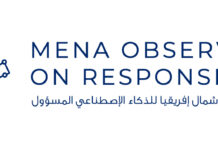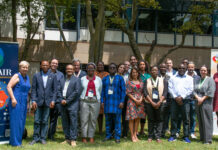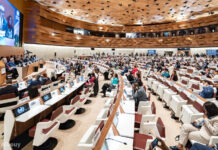(Picture: CPRsouth conference panelists, left to right: George Mulamula, Jean Paul Simon, Idris Rai.)
Information communication technologies (ICT) can play a crucial role in promoting development, making societies more just, equitable, and inclusive of marginalized communities. To see how, some of the brightest young researchers from the “global South” met with established field leaders at the IDRC and COSTECH-sponsored 2016 CPRsouth conference in Zanzibar.
I was fortunate enough to be on the opening plenary panel along with George Mulamula, CEO of the Dar Teknohama Business Incubator (DTBi) and representing the Tanzania Commission for Science and Technology; Dr. Idris Rai, Vice-Chancellor of State University of Zanzibar; Jean Paul Simon; and other IDRC-funded researchers, Sylvia Cadena and Anriette Esterhuyesen. I had the privilege of sharing some of the policy lessons learned over almost a decade of on-the-ground research with Open AIR as well as the opportunity to hear from the other panellists on the exciting things they are doing.
The most important point, and one that was stated by several persons, was that the world’s ICT and innovation policymakers should stop promoting copy/paste policy solutions in African countries, and start listening carefully to the signals coming from evidence on the ground. This is an important point that we at Open AIR share and are determined to highlight, recognizing Africa’s role in the global knowledge economy.
Open AIR’s empirical research suggests there are three equally plausible scenarios for the future of knowledge and innovation in Africa. To be truly “inclusive”, policymakers must pay attention to what might happen in each scenario. Naturally, high technology hubs are a key focus of policymakers’ attention and our research shows that there are now over 350 “hubs” throughout the African continent. Unanswered questions remain, however, about the sustainability of these hubs, their impact on employment and economic growth, and their implications for marginalized communities. More research is needed before policymakers can believe technology hubs are a panacea for ICT-related issues in Africa.
Policymakers must also consider the continent’s vast informal economies. We have seen with our own eyes that innovation in the informal sector is thriving but sadly this is not the kind of innovation that is properly captured within conventional ICT policy frameworks. This informal sector innovation isn’t properly valued because it is hard to measure using conventional metrics. This is even harder to measure because, with a few exceptions, it is only beginning to be studied thoroughly.
As well, indigenous and local community entrepreneurs have important contributions to make for understanding inclusive innovation. Indigenous entrepreneurship is too often neglected on the mistaken impression that “traditional” knowledge is by definition not innovative. This is not true. Indigenous peoples’ innovation is directed less at the creation of artefacts – like patents, peer reviewed publications, or PhD degrees – and more toward systems maintenance and sustainability.
Underpinning all of these issues is the lack of adequate metrics to properly assess and make policies about the kinds of innovation happening in Africa. This is one of the reasons that Open AIR has made this one of our focus areas. Our researchers are devising alternative means of assessing knowledge production and use in African contexts, with special focus on innovation as an instrumental pillar of knowledge.
If you are interested in learning more about these issues, or participating in Open AIR’s research, please get in touch with us through our social media accounts on Twitter, Facebook, or LinkedIn. We look forward to hearing from you!
Jeremy de Beer is a co-founder and director of the Open AIR network. He is a Full Professor at the Centre for Law Technology and Society, University of Ottawa, and a Senior Research Associate at the University of Cape Town’s IP Unit. You can follow him directly at www.JeremydeBeer.com.










